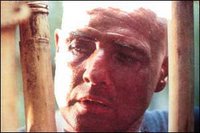 Fiasco: The American Military Adventure In Iraq, by Thomas Ricks.
Fiasco: The American Military Adventure In Iraq, by Thomas Ricks.The short version of The One Percent Doctrine is that Ron Suskind got a bunch of (mostly anonymous) people in the U.S. intelligence community to say that the Bush administration didn't listen to their expert advice and basically screwed up the war in Iraq, especially the occupation and counter-insurgency, through a combination of ignorance, greed and incompetence.
The short version of Fiasco is that Ricks got a bunch of people in the U.S. military community to say much the same thing -- many of them identified by name, rank and serial number.
Apparently, the short version of Bob Woodward's State of Denial is the same thing again, only with
History is not waiting to judge this administration. We'll see if the voters will.
Anyway, Fiasco was pretty amazing for the first half. Ricks is not at all shy about assigning specific blame. His sources provide the facts, and Ricks uses them to hammer the Bushies with his own conclusions. He singles out Rumsfeld in particular. This is a very different style than Suskind, who tended to make his points by implication and indirection.
Some of this shouldn't be suprising, considering the sources. It is no secret that many people in the military have long been opposed to Rumsfeld's style and ideas. Ricks tends to idolize his military sources a bit, but at least his bias is clear, and it's pretty impressive that he got so many active and retired officers to be so candid on the record.
 The second half was not quite as good. It was more focused on the movements on the ground in Iraq, and less on the policy in Washington and the Green Zone. The bad guys here, according to Ricks, are Gen. Sanchez, who was then the top military commander in Iraq, and a Col. Kurtz type named Gen. Odierno, who led one of the Army units whose heavy-handed tactics apparently stoked the fires of the insurgency. There were also frequent, extended passages about particular raids or actions and individual grunt-level soldiers. OK, a little bit of this for the view from the ground is OK, but I got the feeling that he was just recycling the reporting he did for the Washington Post while he was over there.
The second half was not quite as good. It was more focused on the movements on the ground in Iraq, and less on the policy in Washington and the Green Zone. The bad guys here, according to Ricks, are Gen. Sanchez, who was then the top military commander in Iraq, and a Col. Kurtz type named Gen. Odierno, who led one of the Army units whose heavy-handed tactics apparently stoked the fires of the insurgency. There were also frequent, extended passages about particular raids or actions and individual grunt-level soldiers. OK, a little bit of this for the view from the ground is OK, but I got the feeling that he was just recycling the reporting he did for the Washington Post while he was over there.The first, better half of this book could be criticized as military officers saying mean things about politicians. But, largely thanks to Ricks' own commentary, it does include substantive, legitimate policy critique, and it's not just second-guessing. A lot of these guys were warning against this neo-con crap in 2001 and 2002, and, here and in The One Percent Doctrine, they've got the documents to prove it. For better or worse, in this country, our disgruntled military officers and intelligence agents provide information for books like these instead of staging coup d'etats.

No comments:
Post a Comment